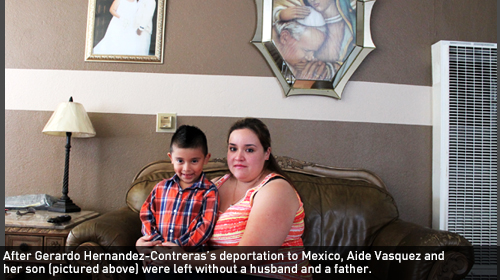
If you ask the Department of Homeland Security (DHS), it doesn't deport parents whose most serious crime is a traffic offense. In fact, according to its statistics, of people deported fell into one of DHS's "priorities" – designed to deport people who pose a threat to
Someone should tell that to , who entered the U.S. in 2001 when he was only 15 years old to find work after his father died. Five years later, he married his wife, U.S. citizen Aide Vasquez, and together they had two children – born and raised in sunny San Diego. On November 27, 2012, Mr. Hernandez-Contreras was headed to pick up ice cream for his kids when he was pulled over by the San Diego Police Department for talking to his wife on his cell phone while driving. DHS officials were called to the scene, and just one day later, he was deported to Mexico, a country he had not lived in for over a decade.
According to DHS, people like Mr. Hernandez-Contreras are not supposed to be deported.
So, what went wrong?
1. Mr. Hernandez-Contreras should never have been taken into DHS custody
The first breakdown in the DHS machine occurred the very moment that DHS took custody of Mr. Hernandez-Contreras. Because San Diego is within 100 miles of the border, Mr. Hernandez-Contreras may have been considered a "recent border entrant" – and thus a DHS priority – despite the fact that he had lived in the country for years. Or DHS may have simply ignored its own stated priorities when it took him into custody. Bottom line: DHS needs to redefine its priorities so they actually focus on safety threats. And DHS needs to adopt a policy of only taking people into custody who fall into one of these new priorities, regardless of whether they are arrested directly by DHS or local police through flawed programs such as Secure Communities.
2. DHS has not implemented its own prosecutorial discretion policy
DHS's next misstep was its failure to appropriately apply its own prosecutorial discretion policy. In , DHS issued its guidance on "prosecutorial discretion" – a mechanism by which DHS closes the cases of people who do not pose a security threat or have circumstances that weigh in favor of them remaining in the U.S. Mr. Hernandez-Contreras was a prime candidate for prosecutorial discretion. He had no criminal history, had lived in the country for over a decade, and had U.S. citizen family. Yet, because DHS does not screen all individuals prior to deportation to determine if they are eligible for discretion, Mr. Hernandez-Contreras slipped through the cracks.
And he's no exception. Discretion has been applied to less than of all cases in the immigration backlog – meanwhile roughly two-thirds of the people that DHS deports either have no criminal history or have only been convicted of minor misdemeanors, such as driving without a license.
3. Mr. Hernandez-Contreras did not get an immigration hearing or even a shred of due process
Similar to over 70 percent of the people that DHS deports, Mr. Hernandez-Contreras never had the opportunity to present his case to a judge. Instead, DHS officials simply presented him with a mechanically pre-checked voluntary return form and encouraged him to sign it based on blatant misrepresentations about the consequences of doing so. By signing the form, he waived his right to a hearing and "consented" to removal/expulsion from the United States. He never received the opportunity to consult with a lawyer, a list of legal service providers, or information regarding the penalties associated with voluntary departure. Nor was he advised that by taking voluntary return, he would be subjected to a ten-year ban on reentering the United States, even though he is married to a U.S. citizen. Had Mr. Hernandez-Contreras received a hearing or the opportunity to consult with a lawyer, he would have been eligible to remain in the country.

Since his deportation, Mr. Hernandez-Contreras has lived in Tijuana – separated both from his wife and his two U.S. citizen children. Just over the border, his 4-year-old son has trouble sleeping without his father, while his six-year-old daughter's performance in school has suffered. His wife has been forced to raise their children on her own. DHS it doesn't deport people like Mr. Hernandez-Contreras. Unfortunately, its enforcement policies tell a different story.
The ACLU's proposed recommendations to DHS to prevent people like Mr. Hernandez-Contreras from being deported can be found here.
Learn more about immigration deportation and other civil liberties issues: Sign up for breaking news alerts, , and .

